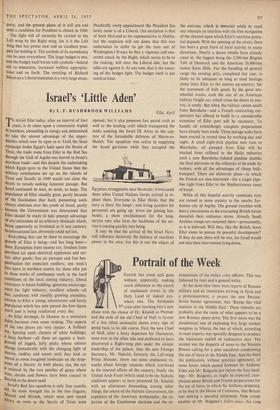Israel's 'Little Aden'
By L. F. RUSHBROOK WILLIAMS
Eilat, April
To revisit Eilat today, after an interval of four years, is to come upon a community tripled in numbers, abounding in energy and determined to take the utmost advantage of the oppor- tunities which now lie open to it. Until the Sinai campaign broke Egypt's hold upon the Straits of Tiran, the trade route from Eilat to the Red Sea through the Gulf of Aqaba was barred to Israel's maritime trade—and this despite the undertaking Which Egypt gave to the United States that the military installations set up on the islands of Tiran and Sanafir in 1949 would not close the straits to vessels seeking innocent passage. But Israel continued to wait, to work, to hope. The Population of Eilat steadily grew, partly because of the fascination that hard, pioneering work always exercises over the youth of Israel, partly because the Government was determined that Eilat should be ready to take prompt advantage of any relaxation of an arbitrary blockade which, being apparently as irrational as it was contrary to international law, obviously could not last.
Everything that can be done to encourage the growth of Eilat is being—and has long been— thane. Exemption from income tax; freedom from Purchase tax upon electrical appliances and cer- tain other goods; free air passages and free hos- pitalisation for expectant mothers; one week's free leave in northern resorts for those who put in three weeks of continuous work in the hard conditions of the local mining industry; liberal assistance in house-building; generous encourage- ment for light industry; excellent schools—all this, combined with steadily growing amenities, attracts to Eilat a young, adventurous and hardy Population which has now passed the four-figure mark and is being reinforced every day.
As Eilat develops, its likeness to a miniature Men becomes even more striking. The aspects of the two places are very similar. A brilliant sea; burning sand; clusters of white buildings; a busy harbour—all these set against a back- ground of jagged, lofty peaks whose colours Change fantastically with the changing light of sunrise, midday and sunset until they look as unreal as some imagined landscape on the drop. scene of a theatre. In both places, too, the eye iS relieved by the rare patches of green where trees, shrubs and flowers have been coaxed to flourish in the desert sand.
Israel's Red Sea squadron is only four months old. Its main strength lies in the two frigates, Miznak and Mivtah, which were sent round Africa as soon as the Straits of Tiran were opened; but it also possesses fast patrol craft as well as the landing craft which transported the tanks assisting the Israel IX Army in the cap- ture of the formidable defences of Sharm-es- Sheikh: The squadron was active in supplying the Israel garrisons while they occupied the Egyptian strongpoints near the straits; it evacuated them when United Nations forces arrived to re- place them. Everyone in Eilat thinks that the navy is there 'for keeps'; new living quarters for personnel are going up; wives are joining hus- bands; a shore establishment for the long- seryice men who form the backbone of the ser- vice is coming quickly into being.
It may be that the arrival of the Israel Navy will influence decisively the balance of maritime power in the area; but this is not the object of the exercise, which is intended solely to repel any attempts to interfere with the free navigation of the channel upon which Eilat's maritime poten- tial depends. With the opening of the straits, there has been a great burst of local activity in many directions. Nearly a dozen vessels have already come in, the biggest being the 3,500-ton Brigitte Toft of Denmark and the American 10,400-ton tanker Kern Hills. For the handling of general cargo the existing jetty, completed last year, is likely to be adequate so long as road haulage alone links Eilat to the centres up-country; for the movement of bulk goods by the great ten- wheeled trucks, each the size of an American railway freight car, which cross the desert in con- voy, is costly. But when the railway comes south from Beersheba—and a French contracting cor- poration has offered to build it—a considerable extension of Eilat port will be necessary. To handle oil astonishingly complete preparations have already been made. Three storage tanks have been erected in record time by working day and night. A small eight-inch pipeline now runs to Beersheba; oil pumped from Eilat will be trucked from railhead to the Haifa refineries until a new Beersheba-Ashdod pipeline enables the final deliveries to the refineries to be made by tankers, with all the advantages of cheap bulk- transport. There are elaborate plans—in which the French are also interested—for a larger pipe- line right from Eilat to the Mediterranean coast of Israel.
While all this hopeful activity continues, eyes are turned in some anxiety to the nearby Jor- danian city of Aqaba. The ground trembles with heavy concussions as the evacuating British forces demolish their ordnance stores. Already Saudi Arabian troops are stationed there—permanently, as it is believed. Will they, like the British, leave Eilat alone to pursue its peaceful development? If they do not, there will be war, for Israel would not take their intervention lying down.






























 Previous page
Previous page